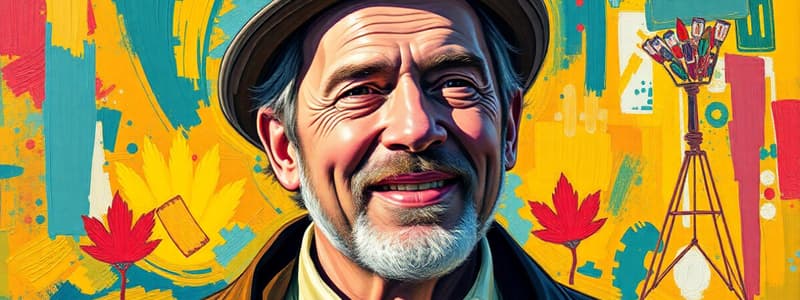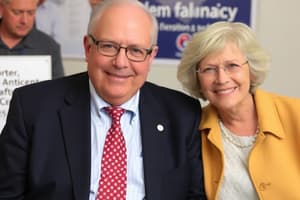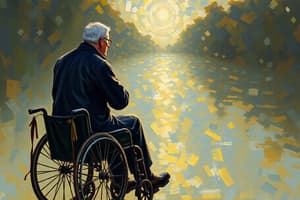Podcast
Questions and Answers
What was Bill's stance on the concept of obstacles in his life?
What was Bill's stance on the concept of obstacles in his life?
- He recognized several obstacles but chose to overcome them.
- He thought obstacles were overrated and insignificant.
- He believed he had no obstacles at all. (correct)
- He admitted to having a few manageable obstacles.
How did the author initially plan to approach the speech about Bill?
How did the author initially plan to approach the speech about Bill?
- By emphasizing the obstacles Bill overcame. (correct)
- By recounting Bill's childhood experiences.
- By discussing audience participation.
- By highlighting Bill's athletic achievements.
What did Bill believe the word 'obstacle' represented?
What did Bill believe the word 'obstacle' represented?
- A minor challenge that enhances resilience.
- A temporary hurdle that can be overcome.
- An excuse used by those who fail to succeed.
- Something that completely blocks progress towards a goal. (correct)
What emotion did the author feel towards Bill’s view on obstacles?
What emotion did the author feel towards Bill’s view on obstacles?
What goals did the author ultimately wish to achieve, in contrast to her childhood aspirations?
What goals did the author ultimately wish to achieve, in contrast to her childhood aspirations?
What maxim did Bill's mother impart to him when he was eight years old?
What maxim did Bill's mother impart to him when he was eight years old?
How did Bill respond to the weather advisories during the icy storm?
How did Bill respond to the weather advisories during the icy storm?
Which of the following best describes Bill's approach to typing his orders?
Which of the following best describes Bill's approach to typing his orders?
What caused Bill to initially feel upset about the article written about him?
What caused Bill to initially feel upset about the article written about him?
What does Bill believe about his capability despite his condition?
What does Bill believe about his capability despite his condition?
What health issue ultimately led Bill to stop flying?
What health issue ultimately led Bill to stop flying?
How did Bill initially react to the article about him?
How did Bill initially react to the article about him?
What innovation did Bill and his wife use to continue their presentations?
What innovation did Bill and his wife use to continue their presentations?
What did Bill call his episodes of shortness of breath?
What did Bill call his episodes of shortness of breath?
What limitation guided Bill's decision to cease air travel?
What limitation guided Bill's decision to cease air travel?
How many readers reached out to Bill after the Oregonian article was published?
How many readers reached out to Bill after the Oregonian article was published?
What did Bill often experience after walking short distances?
What did Bill often experience after walking short distances?
What was the name of the company Bill was associated with for sales?
What was the name of the company Bill was associated with for sales?
What did the audience typically identify as Bill's greatest obstacle?
What did the audience typically identify as Bill's greatest obstacle?
What life event did Bill repeatedly dismiss as an obstacle?
What life event did Bill repeatedly dismiss as an obstacle?
Flashcards
Bill's Perspective on Obstacles
Bill's Perspective on Obstacles
Bill believes that obstacles are things that completely block someone from achieving a goal. He doesn't see his challenges as obstacles, as he always reaches his goals.
Overcoming Obstacles
Overcoming Obstacles
The process of successfully dealing with challenges or difficulties in order to achieve one's goals.
Bill Porter's Speech
Bill Porter's Speech
A speech by Bill Porter where the speaker struggled to find obstacles in Bill's life because Bill does not believe in obstacles. This changed the focus of the speech itself.
Speaker's Initial Goal
Speaker's Initial Goal
Signup and view all the flashcards
Unattainable Goals
Unattainable Goals
Signup and view all the flashcards
Bill Porter's Optimism
Bill Porter's Optimism
Signup and view all the flashcards
Bill's Approach to Obstacles
Bill's Approach to Obstacles
Signup and view all the flashcards
Bill's Typing Method
Bill's Typing Method
Signup and view all the flashcards
Reaction to the Oregonian Article
Reaction to the Oregonian Article
Signup and view all the flashcards
Bill's Perspective on Cerebral Palsy
Bill's Perspective on Cerebral Palsy
Signup and view all the flashcards
Bill Porter's condition
Bill Porter's condition
Signup and view all the flashcards
Oregonian article
Oregonian article
Signup and view all the flashcards
Hallman's intentions
Hallman's intentions
Signup and view all the flashcards
Bill's perspective on limitations
Bill's perspective on limitations
Signup and view all the flashcards
Virtual presentations
Virtual presentations
Signup and view all the flashcards
Breathing episodes
Breathing episodes
Signup and view all the flashcards
Progressive Lung Disease
Progressive Lung Disease
Signup and view all the flashcards
Bill's sales records
Bill's sales records
Signup and view all the flashcards
Impact of air travel
Impact of air travel
Signup and view all the flashcards
Bill's personal perspective
Bill's personal perspective
Signup and view all the flashcards
Study Notes
Bill Porter's Perspective on Obstacles
- Bill Porter, a speaker, genuinely believes he has no obstacles.
- He defines obstacles as things that completely block a goal, instead, he perceives every situation as a challenge.
Bill's Approach to Life's "Challenges"
- Bill sees challenges as opportunities, not impediments.
- He approaches even harsh weather conditions and difficult tasks with optimism.
- His optimism is apparent in his approach to weather forecasts.
- He views unpleasant weather not as an obstacle but as an opportunity to work harder.
- He doesn't let physical challenges hinder him; if a task is too taxing he uses a helper.
Example: Managing Physical Limitations
- During Alaska storm, Bill continued door-to-door sales, even though customers advised against it.
- He exceeded his quota despite having to hitchhike home in difficult weather conditions.
- He refused help with daily tasks, even when offered. Emphasized self-reliance.
- He sees obstacles as minor setbacks that can be overcome.
- He prioritizes completing his work. Rather than taking taxis/assistance, he made his way.
Example: Bill's Attitude Towards Typing
- He insists on typing his orders, seeing typing as a way of relaxing and planning.
- He refused to accept help with his typing despite numerous offers.
The Oregonian Article's Impact
- The reporter described him and physical condition as "twisted".
- This upset Bill because he doesn't see himself as someone who suffers,
- Bill was upset about how his physical condition was portrayed in the article.
- He felt it portrayed a negative image in an attempt to clarify Bill's physical condition.
- Ultimately, the article created new business for Bill.
Bill's Health Issues and Adapting
- Air travel became problematic due to breathing difficulties/lung disease.
- The problems were compounded by developing panic attacks triggered by a fear of shortness of breath.
- Bill's health issues forced him to curtail air travel.
- This did not lead him to give up his work, innovative technology enabled virtual presentations.
- These virtual presentations maintain Bill's visibility through live telephone/video,
- Audiences responded just as strongly to virtual Bill as they did to Bill in person.
The Author's Personal Growth and Inspiration
- During their speaking engagements, audiences often ask about the biggest challenges Bill overcame.
- The author points out how Bill dismisses each as something he routinely conquers.
- The author's observations of Bill inspired her to look at her obstacles in a different way.
- The author recognizes the impact of Bill's positive attitude on herself.
The Author's Personal "Obstacle"
- Personal obstacle related to attitude toward money,
- This stemmed partly from the family's difficult experiences with limited resources.
- The author developed an obsession with bargain-hunting, which negatively affected her marriage and family.
- She relied heavily on bargain items and freebies, sometimes affecting daily routines.
- A conversation with Bill helped the author change their spending habits.
- In the end, the author learned to value love and appreciation over possessions.
Bill and The Author's Shared Values
- Bill's emphasis on positivity and finding value in challenges,
- The author values love, appreciation, and family time.
- Realizing that she didn't encounter significant obstacles if she avoided unnecessary spending.
Studying That Suits You
Use AI to generate personalized quizzes and flashcards to suit your learning preferences.





